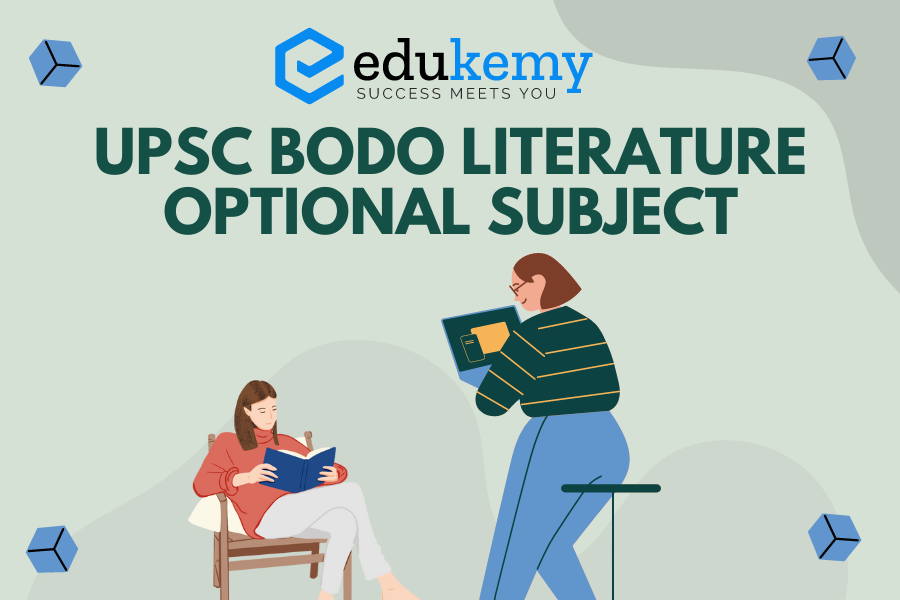The UPSC Civil Services Examination offers Bodo Literature as an optional subject, delving into the rich literary heritage of the Bodo people. This subject equips aspirants with a comprehensive understanding of Bodo literature, encompassing its history, prominent authors, diverse genres like poetry and drama, and the recurring themes that resonate within Bodo society. By opting for Bodo Literature, candidates embark on a journey to explore the cultural and social landscape of the Bodos, gaining valuable insights applicable not just to the exam but also to a deeper understanding of India’s vibrant literary tapestry.
Contents
Bodo Paper 1
Section – A
- History of Bodo Language
- Homeland, language family, its present status and its mutual contact with Assamese.
- (a) phonemes: Vowel and Consonant Phonemes.
- (b) Tones.
- Morphology: Gender, Case and Case endings, Plural suffix, Definitives, Verbal suffix.
- Vocabulary and its sources.
- Syntax: Types of sentences, Word Order.
- History of scripts used in writing Bodo Language since inception.
Section – B
History of Bodo Literature
- General introduction of Bodo folk Literature.
- Contribution of the Missionaries.
- Periodization of Bodo Literature.
- Critical analysis of different genres (Poetry, Novel, Short Story, and Drama).
- Translation Literature.
Bodo Paper 2
Section – A
(a) Khonthai-Methai (Edited by Madaram Brahma & Rupnath Brahma)
(b) Hathorkhi-Hala (Edited by Pramod Chandra Brahma)
(c) Boroni Gudi Sibsa Arw Aroz : Madaram Brahma
(d) Raja Nilambar : Dwarendra Nath Basumatary
(e) Bibar (prose section) (Edited by Satish Chandra Basumatary)
Section – B
(a) Bibi Bithai (Aida Nwi) : Bihuram Boro
(b) Radab : Samar Brahma Chaudhury
(c) Okhrang Gongse Nangou : Brajendra Kumar Brahma
(d) Baisagu Arw Harimu : Laksheswar Brahma
(e) Gwdan Boro : Manoranjan Lahary
(f) Jujaini Or : Chittaranjan Muchahary
(g) Mwihoor : Dharanidhar Wary
(h) Hor Badi Khwmsi : Kamal Kumar Brahma
(i) Jaolia Dewan : Mangal Singh Hozowary
(j) Hagra Guduni Mwi : Nilkamal Brahma
Frequently Asked Questions (FAQs)
1. What is Bodo Literature Optional in UPSC?
The Bodo Literature Optional is a subject offered in the UPSC Civil Services Examination where you study literary works written in the Bodo language. It covers the history, prominent authors, various literary forms, and recurring themes within Bodo literature.
2. Who should opt for Bodo Literature Optional?
This subject is ideal for candidates with a strong interest and background in Bodo language and culture. Familiarity with the language allows for a deeper understanding and analysis of the literature, making preparation more enjoyable and potentially scoring higher marks.
3. What is the exam pattern for Bodo Literature Optional?
The Bodo Literature Optional consists of two papers, each carrying 250 marks. Both papers are divided into two sections with four questions each. You have to attempt five questions, with Question 1 and Question 5 being compulsory. The remaining three can be chosen from the remaining six, ensuring at least one from each section. Importantly, answers must be written in Bodo language only.
4. How to prepare for Bodo Literature Optional?
Here’s a general approach for preparation:
- Build a strong foundation: Utilize textbooks, literary anthologies, and critical essays to understand the core concepts of Bodo literature.
- Master the syllabus: Ensure you cover all topics mentioned in the official UPSC syllabus for Bodo Literature Optional [search UPSC Bodo Literature Optional Syllabus for UPSC Mains].
- Develop writing practice: Regularly write analytical essays and critiques on Bodo literature to improve your analytical and expressive skills in the Bodo language.
- Analyze toppers’ copies: Refer to toppers’ answer sheets (if available) to understand effective writing styles and answer structuring for the exam.
5. Are there any advantages to choosing Bodo Literature Optional?
If you possess a genuine interest in Bodo literature and are comfortable with the language, opting for this subject can be advantageous. It allows you to leverage your existing knowledge and potentially score well due to fewer competitors compared to more popular optional subjects.
In case you still have your doubts, contact us on 9811333901.
For UPSC Prelims Resources, Click here
For Daily Updates and Study Material:
Join our Telegram Channel – Edukemy for IAS
- 1. Learn through Videos – here
- 2. Be Exam Ready by Practicing Daily MCQs – here
- 3. Daily Newsletter – Get all your Current Affairs Covered – here
- 4. Mains Answer Writing Practice – here

